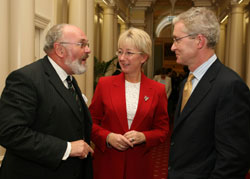Posted: 02 November 2006
The Future for Humanities and Social Sciences
in 21st Century Ireland
The Irish Universities Association (IUA), in association with the Irish Research Council for Humanities and Social Sciences (IRCHSS), held a major conference - “Humanities and Social Sciences in 21st Century Ireland - Delivering the Knowledge Society” - on the 23rd and 24th of October in the Royal College of Physicians, No6 Kildare Street, Dublin 2.
The conference brought together Irish and international experts from many different backgrounds reflecting the broad church of the Humanities and Social Sciences. This was the first time such a major conference focusing on the Humanities and Social Sciences (HSS) and their role in Irish Society had been organised.

Dr Hugh Brady pictured with Senator David Norris who was chairing the conference and Mary Hanafin T.D, Minister for Education and Science.
Addressing the conference, Mary Hanafin T.D, Minister for Education and Science, said that "Ireland is proud to market its highly educated workforce to potential international investors. Our graduates of the humanities and social sciences are eminent among the bright, creative, flexible and innovative talent for which Ireland has become renowned.”
The Minister went on to state how, in the discussions of the Knowledge Society, there is a great focus on the “hard” sciences but it must not be forgotten that the bulk of graduates are in HSS. 60% of primary degree graduates are in HSS with 56% going into employment and 33% continuing with further studies. Of all the Masters graduates 70% are in HSS with 76% going into employment and 14% to further studies. The bulk of 3rd level graduates going into employment have HSS backgrounds and contribute to all aspects of the economy and society: business, financial services, law, public service and politics.
In relation to the importance of research in HSS to the Government when dealing with policy making, Norman Glass, CEO of the National Centre for Social Research in the UK and former Deputy Director of the UK Treasury, pointed out that, “Academics have a role to play in informing government and the wider civil society and they can do this through the application of science to public policy and through ensuring that they communicate their work in a comprehensible way".
In his presentation Nicholas Canny, Vice President for Research at NUI Galway, contended that research in the Humanities was more critical than ever in an Irish society which was undergoing change at an unprecedented pace because it was only people with training in humanities disciplines who could alert us of our responsibilities as Irish people, as Europeans, as members of our local communities, and as citizens of the world.
Speaking at conference Dr Conor O’Carroll, Head of the Research Office at the Irish Universities association said that, “Science and technology has received strong government support through its importance to the economy and by convincing arguments made by advocates for their disciplines”. He went on to say that the challenge to the HSS community is the span the divide between its many diverse disciplines and make a coherent case to government and those who influence government policy.
Emerging digital technologies are also changing the face of research in Humanities and Social Science today. Ground breaking work is being carried out by the libraries of the seven universities with projects such as the Irish Research eLibrary ”IreL”, a €15million project. According to Paul Sheehan, Head of Library Services at DCU, the response from the research community in Ireland has been very positive, “At the moment over 25 million articles are delivered direct to the desktop of researchers regardless of location. This means that researchers in Irish Universities now have access to a world-class electronic library service comparable to any such service in the international research community.”
William Schabas, Director of the Irish Centre for Human Rights at NUI Galway spoke about how Human Rights weave together many of the main strands of the humanities and social sciences: law and international relations, as well as sociology, history, philosophy and even literature. Since its establishment in 2000, the Irish Centre for Human Rights has engaged in academic research concerning such matters as post-conflict justice and reconciliation, criminal law reform, institutional racism and promotion of equality in various spheres.
Clear benefits in the area of economic development were also highlighted by Sean O’Riain, Head of the Department of Sociology at NUI Maynooth. He explained how Arts graduates are the bedrock of the labour force, and is one of the leading sources of skilled workers for the growing service and information industries. They bring with them the crucial skills that underpin the knowledge economy - the understanding of complex concepts, the collection and analysis of data, and the ability to turn information overload into meaningful knowledge.
The knowledge society therefore requires many different kinds of knowledge. This diversity of knowledge can only emerge when there is enough support for a range of models of teaching and research. A policy of 'institutional mono-cropping' which focuses heavily on the laboratory model of research in biotech and ICT will weaken the 'biodiversity' necessary to grow a rich crop of different forms of knowledge to support Ireland's economic, social and cultural development. The Humanities and Social Sciences are essential elements of that diversity - and of that development.
The development of a balanced society with a sustainable quality of life is essential if economic prosperity is to be underwritten on a long-term basis. The informed contribution to public debate and policy formulation by economists, political scientists, sociologists, anthropologists, psychologists and lawyers supports governments' ongoing responses to the complex challenges which face Ireland in a compressed and heightened process of social and economic transformation.
